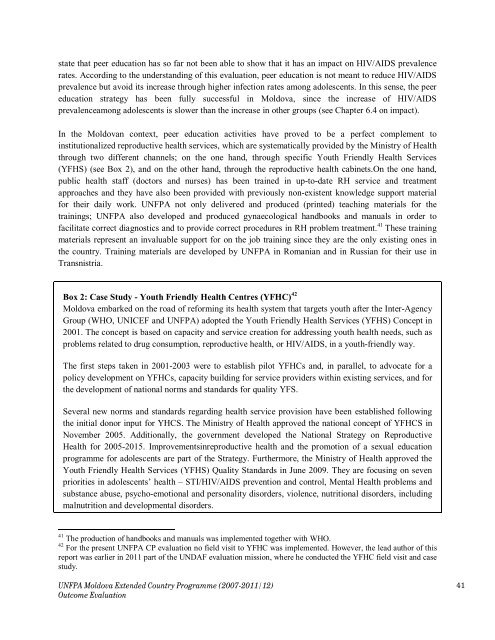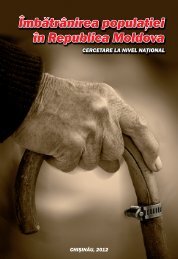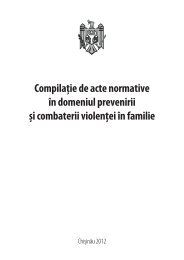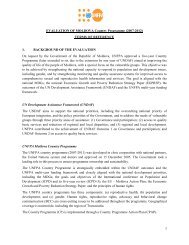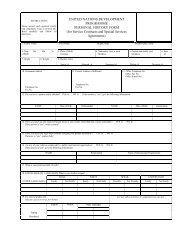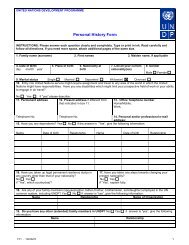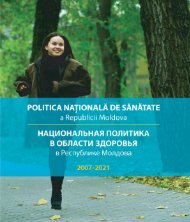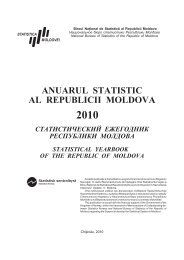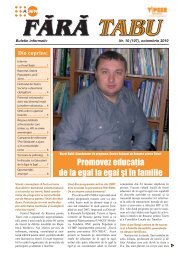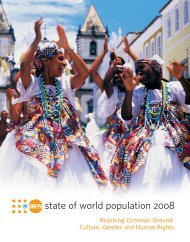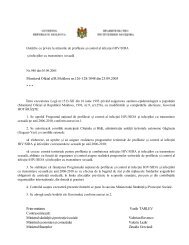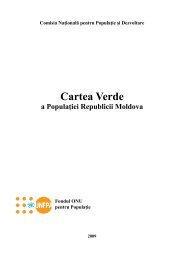Country Programme (2007-2011/2012) evaluation - UNFPA Moldova
Country Programme (2007-2011/2012) evaluation - UNFPA Moldova
Country Programme (2007-2011/2012) evaluation - UNFPA Moldova
Create successful ePaper yourself
Turn your PDF publications into a flip-book with our unique Google optimized e-Paper software.
state that peer education has so far not been able to show that it has an impact on HIV/AIDS prevalence<br />
rates. According to the understanding of this <strong>evaluation</strong>, peer education is not meant to reduce HIV/AIDS<br />
prevalence but avoid its increase through higher infection rates among adolescents. In this sense, the peer<br />
education strategy has been fully successful in <strong>Moldova</strong>, since the increase of HIV/AIDS<br />
prevalenceamong adolescents is slower than the increase in other groups (see Chapter 6.4 on impact).<br />
In the <strong>Moldova</strong>n context, peer education activities have proved to be a perfect complement to<br />
institutionalized reproductive health services, which are systematically provided by the Ministry of Health<br />
through two different channels; on the one hand, through specific Youth Friendly Health Services<br />
(YFHS) (see Box 2), and on the other hand, through the reproductive health cabinets.On the one hand,<br />
public health staff (doctors and nurses) has been trained in up-to-date RH service and treatment<br />
approaches and they have also been provided with previously non-existent knowledge support material<br />
for their daily work. <strong>UNFPA</strong> not only delivered and produced (printed) teaching materials for the<br />
trainings; <strong>UNFPA</strong> also developed and produced gynaecological handbooks and manuals in order to<br />
facilitate correct diagnostics and to provide correct procedures in RH problem treatment. 41 These training<br />
materials represent an invaluable support for on the job training since they are the only existing ones in<br />
the country. Training materials are developed by <strong>UNFPA</strong> in Romanian and in Russian for their use in<br />
Transnistria.<br />
Box 2: Case Study - Youth Friendly Health Centres (YFHC) 42<br />
<strong>Moldova</strong> embarked on the road of reforming its health system that targets youth after the Inter-Agency<br />
Group (WHO, UNICEF and <strong>UNFPA</strong>) adopted the Youth Friendly Health Services (YFHS) Concept in<br />
2001. The concept is based on capacity and service creation for addressing youth health needs, such as<br />
problems related to drug consumption, reproductive health, or HIV/AIDS, in a youth-friendly way.<br />
The first steps taken in 2001-2003 were to establish pilot YFHCs and, in parallel, to advocate for a<br />
policy development on YFHCs, capacity building for service providers within existing services, and for<br />
the development of national norms and standards for quality YFS.<br />
Several new norms and standards regarding health service provision have been established following<br />
the initial donor input for YHCS. The Ministry of Health approved the national concept of YFHCS in<br />
November 2005. Additionally, the government developed the National Strategy on Reproductive<br />
Health for 2005-2015. Improvementsinreproductive health and the promotion of a sexual education<br />
programme for adolescents are part of the Strategy. Furthermore, the Ministry of Health approved the<br />
Youth Friendly Health Services (YFHS) Quality Standards in June 2009. They are focusing on seven<br />
priorities in adolescents’ health – STI/HIV/AIDS prevention and control, Mental Health problems and<br />
substance abuse, psycho-emotional and personality disorders, violence, nutritional disorders, including<br />
malnutrition and developmental disorders.<br />
41 The production of handbooks and manuals was implemented together with WHO.<br />
42 For the present <strong>UNFPA</strong> CP <strong>evaluation</strong> no field visit to YFHC was implemented. However, the lead author of this<br />
report was earlier in <strong>2011</strong> part of the UNDAF <strong>evaluation</strong> mission, where he conducted the YFHC field visit and case<br />
study.<br />
<strong>UNFPA</strong> <strong>Moldova</strong> Extended <strong>Country</strong> <strong>Programme</strong> (<strong>2007</strong>-<strong>2011</strong>/12)<br />
Outcome Evaluation<br />
41


